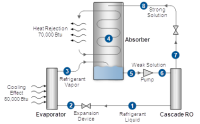Cascade Reverse Osmosis Air Conditioning System

Technology Description:
Battelle Memorial Institute is developing a new air conditioning system that uses a cascade reverse osmosis-based absorption cycle. Analyses show that this new cycle can be as much as 60% more efficient than vapor compression, which is used in 90% of air conditioners. Traditional vapor-compression systems use polluting liquids for a cooling effect. Absorption cycles use benign refrigerants such as water, which is absorbed in a salt solution and pumped as liquid—replacing compression of vapor. The refrigerant is subsequently separated from absorbing salt using heat for re-use in the cooling cycle. Battelle is replacing thermal separation of refrigerant with a more efficient reverse osmosis process. Research has shown that the cycle is possible, but further investment will be needed to reduce the number of cascade reverse osmosis stages and therefore cost.
Potential Impact:
If successful, Battelle would provide an efficient cooling cycle.
Security:
Increased energy efficiency would decrease U.S. energy demand and reduce reliance on fossil fuels—strengthening U.S. energy security.
Environment:
Refrigerants with polluting emissions could account for up to 10%-20% of global warming by year 2050. Battelle's technology could eliminate the use of these refrigerants.
Economy:
Widespread adoption of this technology could reduce energy consumption for air conditioning of buildings—providing consumers with cost savings on energy bills.
Contact
ARPA-E Program Director:
Dr. Ravi Prasher
Project Contact:
Dr. Stephen Ricci
Press and General Inquiries Email:
ARPA-E-Comms@hq.doe.gov
Project Contact Email:
ricci@battelle.org
Partners
Solution Dynamics, LLC
Related Projects
Release Date:
03/02/2010
